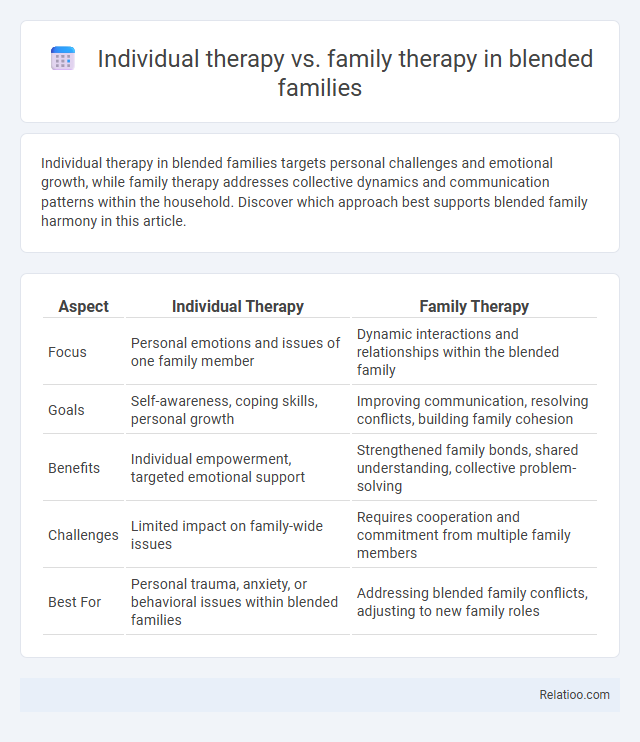Individual therapy in blended families targets personal challenges and emotional growth, while family therapy addresses collective dynamics and communication patterns within the household. Discover which approach best supports blended family harmony in this article.
Table of Comparison
| Aspect | Individual Therapy | Family Therapy |
|---|---|---|
| Focus | Personal emotions and issues of one family member | Dynamic interactions and relationships within the blended family |
| Goals | Self-awareness, coping skills, personal growth | Improving communication, resolving conflicts, building family cohesion |
| Benefits | Individual empowerment, targeted emotional support | Strengthened family bonds, shared understanding, collective problem-solving |
| Challenges | Limited impact on family-wide issues | Requires cooperation and commitment from multiple family members |
| Best For | Personal trauma, anxiety, or behavioral issues within blended families | Addressing blended family conflicts, adjusting to new family roles |
Understanding Blended Families: Unique Challenges
Individual therapy in blended families focuses on your personal experiences, emotions, and coping strategies, helping you navigate complex family dynamics independently. Family therapy addresses the unique challenges of blended families by fostering communication, resolving conflicts, and building cohesion among all members, including step-parents and step-siblings. Counseling in this context combines these approaches, offering tailored support to understand and manage blended family issues effectively.
What Is Individual Therapy? Overview and Goals
Individual therapy in blended families focuses on personal growth, emotional regulation, and healing past relationship wounds to improve self-awareness and coping strategies. The primary goal is to support the individual's mental health by addressing specific issues such as anxiety, depression, or adjustment challenges within complex family dynamics. This personalized approach contrasts with family therapy, which targets relational patterns and communication among family members to enhance collective functioning.
What Is Family Therapy? Overview and Process
Family therapy involves structured sessions where a therapist guides blended families through communication challenges and relationship dynamics to foster understanding and cohesion. It focuses on addressing issues within the family system, promoting healthy interaction patterns, and resolving conflicts that arise from combining different family units. The process typically includes assessment, goal setting, and collaborative interventions tailored to improve emotional connections and problem-solving skills among family members.
Key Issues Addressed in Individual Therapy for Blended Families
Individual therapy in blended families focuses on personal identity struggles, loyalty conflicts, and boundary challenges that arise from merging different family systems. Key issues addressed include managing ambivalence toward stepparents, processing grief over previous family structures, and developing effective communication skills to navigate blended family dynamics. Unlike family therapy or general counseling, individual sessions provide a tailored space for resolving internal emotional conflicts without the complexity of group interactions.
How Family Therapy Supports Blended Family Dynamics
Family therapy in blended families addresses unique challenges such as role confusion, loyalty conflicts, and communication barriers by fostering open dialogue and mutual understanding among all family members. Unlike individual therapy, which centers on personal issues, family therapy promotes collective problem-solving and strengthens relationships, improving overall family cohesion. Counseling tailored for blended families emphasizes building trust and establishing new family norms, supporting smoother integration and emotional adjustment for step-parents and step-children.
Benefits of Individual Therapy for Parents and Children
Individual therapy for parents and children in blended families enhances personal emotional regulation and addresses unique challenges stemming from complex family dynamics. It provides a private space to explore identity, develop coping strategies, and manage stress related to stepfamily integration. This focused approach often leads to improved communication skills and stronger emotional resilience within the family system.
Advantages of Family Therapy in Resolving Blended Family Conflicts
Family therapy in blended families effectively addresses complex dynamics by fostering open communication and mutual understanding among step-parents, step-siblings, and biological parents. It provides a structured environment to resolve attachment issues, role confusion, and loyalty conflicts unique to blended family systems, leading to stronger relational bonds. Compared to individual therapy, family counseling promotes collective problem-solving and emotional support, enhancing overall family cohesion and stability.
When to Choose Individual Therapy vs Family Therapy
Individual therapy focuses on addressing personal emotional and psychological challenges, making it ideal when your concerns involve self-esteem, anxiety, or depression within blended families. Family therapy becomes essential when communication issues, conflicts, or relationship dynamics among step-siblings and stepparents impact the overall family harmony. Choosing between these approaches depends on whether your goals center on personal growth or improving collective family interactions.
Integrating Both Approaches: Combined Therapy Solutions
Individual therapy addresses Your personal challenges within blended families by fostering self-awareness and coping strategies, while family therapy focuses on improving communication and resolving conflicts among all members. Combined therapy solutions integrate both approaches, enhancing emotional healing and strengthening relationships through tailored interventions that consider both individual needs and family dynamics. This holistic method promotes a balanced, supportive environment essential for the success of blended family systems.
Finding the Right Therapist for Blended Family Needs
Finding the right therapist for your blended family requires an understanding of the unique dynamics within individual therapy versus family therapy settings. Individual therapy focuses on addressing personal issues and emotional challenges, while family therapy facilitates communication, conflict resolution, and bonding among all family members. You should seek a counselor experienced in blended family structures who can tailor sessions to meet both individual and collective needs effectively.

Infographic: Individual therapy vs family therapy in blended families
 relatioo.com
relatioo.com